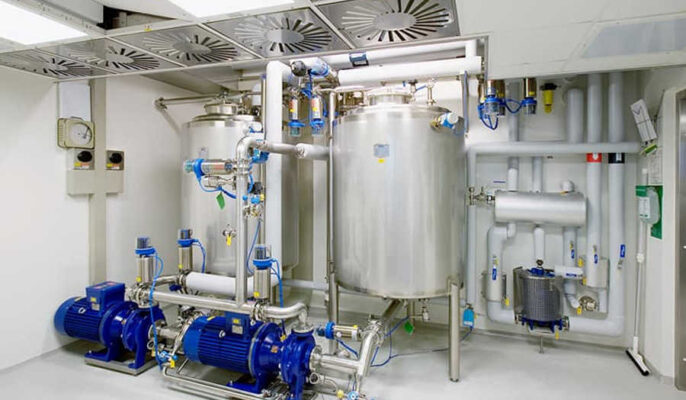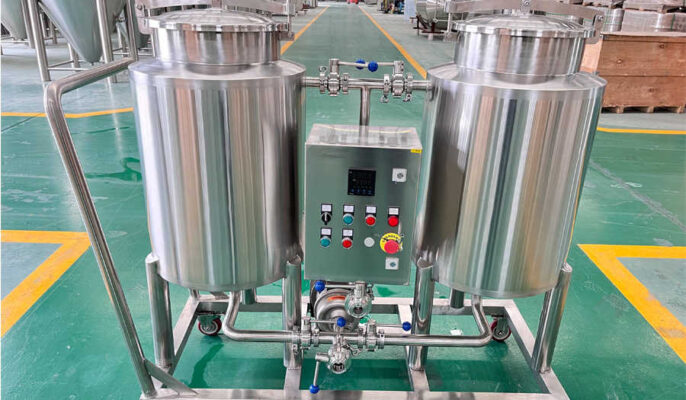Hygiene is always a top priority for winemakers, especially after the corona crisis. The most common method of achieving cleaning of tanks, piping, and other brewery equipment is through clean-in-place (CIP). CIP systems provide fast, efficient and reliable cleaning for all types of process plants. This is a way to clean entire plant equipment or plumbing circuits without dismantling the equipment.
Brewery CIP Tanks
The size and number of brewery CIP tanks vary depending on the type of CIP cycle and the size of the brewery. Storage tanks can be used for a variety of CIP applications including fresh water, caustic, acids, reuse (cleaning or flushing) and sanitizers. For example AISI 304, 316 or 316L. It is acceptable to use 304 stainless steel in some brewery CIP tank applications, but most quality CIP system manufacturers use 316/316L as the standard material for all wetted parts, including tanks.

Single tank system
The most common are simple circuits that only must cleaning or flushing. Each loop is dumped down the drain after one pass.
Advantage
- Avoid allergen and cross-contamination issues. Because it’s dumped down the drain after every pass
- Single-tank systems must lower initial investment than multi-tank systems
- Requires less space and can be mounted on a cart for easy moving.
Precautions
- Each cycle must use the same storage tank.
- Not recommended for many cycle or re-use strategies.
- The cleaning cycle takes more time to refill and heat the tank per cycle.
- Water and chemical usage is higher in single tank systems because each wash and rinse must be drained after completion.
Two tank system
One tank is for pre-rinse or final rinse and the other tank is for an alkaline cleaning solution.
Advantage
- Alkali wash can be returned to the tank and reused many times.
- Pre-fill and preheat each tank as needed before starting the cleaning cycle, reducing cleaning time.
- Can be installed on a cart for easy movement.
Precautions
- More space is required.
- Less mobility than single-tank systems.
Three tank system
A system with three tanks offers more cleaning options than a smaller system.
Advantage
- The water/alkali/acid cycle is common in many cleaning applications because it includes pre-filling and pre-heating of all solutions, reducing cleaning time.
- Based on the amount of soil in the treatment system, the alkaline and pickling solutions can be returned and reused.
- Water/Alkali/Reuse: If pickling is not required, reuse tanks can collect soiled caustic washes and use them as an effective pre-rinse for the next cleaning sequence.
- Water/Alkali/Alternative Alkali: Used to clean many circuits with different types of product fouling requiring different types or concentrations of alkaline cleaning.

Four tank system
More tanks in a four-tank system provide the flexibility to recover and reuse solutions without sacrificing the convenience of a single caustic and acid solution tank.
- Complex, automated systems include valves and instruments that watch key variables and provide data for system verification and validation.
- Water/caustic/acid/reuse is a typical four-tank setup, allowing for prefilling and preheat for each wash and optional reuse wash.
- Water/Alkali/Replacement Alkali/Reuse Cycles can use different types of products to clean soil and must many alkali wash cycles of different concentrations. All without sacrificing reuse options.
Precautions
- Space requirements
- More complex systems
- Generally not suitable for vehicle movement
- Requires more initial investment
By sport type
Pump on cart
Many small brewery start-ups start with this type of CIP cart. Pump trucks are often multipurpose, and used for transfer processes and CIP cleaning activities.
Advantage
Can be used anywhere on the device, but it’s a manual option.
Shortcoming
Do not heat or maintain a temperature of cleaning chemicals. Manufacturers must use temperatures above the chemical’s recommended temperature so that the chemical remains within the operating range when it comes into contact with the equipment. Without the ability to check temperature, the effectiveness of the CIP system cannot be guaranteed.
Mobile CIP Skid Mounted
This type of design offers the mobility of a pump truck and the practicality of custom equipment.
Advantage
- Chemicals can be captured for many recycling, reducing costs and the brewery’s environmental impact.
- Providing heat and maintaining a simple temperature lets the brewer know that the chemical is within its operating range.
- CIP skids with many reservoirs can be pre-filled and pre-heated during the CIP process.
- Allows for the use of many solution types to create an optimal cleaning solution.
- Detachable, ideal solution for remote devices.




